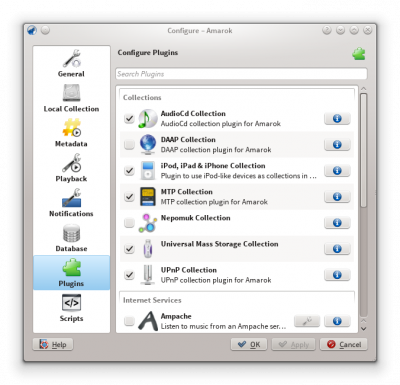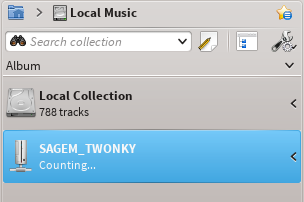Amarok/Manual/Organization/Collection/RemoteCollections/UPnP: Difference between revisions
m (fix) |
(add mention of missing kio-UPnP) |
||
| (22 intermediate revisions by 9 users not shown) | |||
| Line 1: | Line 1: | ||
<languages /> | |||
<span id="Universal Plug and Play (UPnP)"><translate> | |||
=== | ===== Universal Plug and Play (UPnP) / DLNA ===== <!--T:1--> | ||
<!--T:2--> | |||
''UPnP'' is a set of protocols to share media on the network. It is also supported by a wide range of residential gateways and Network Attached Storage devices. UPnP support is now commonly marketed as [http://en.wikipedia.org/wiki/DLNA DLNA]. | |||
''UPnP'' | |||
<!--T:7--> | |||
'''Amarok''' has a built-in UPnP media share client so it can play tracks shared on the network. To enable it, use <menuchoice>Settings -> Configure Amarok -> Plugins -> Collections</menuchoice> and check the box by the '''UPnP Collection''' plugin. | |||
<!--T:8--> | |||
[[File:Amarok_2.8_UPnP_collection_plugin.png|center|400px]] | |||
<!--T:9--> | |||
When a media share is discovered it will be shown in '''Local Music'''. | |||
<!--T:10--> | |||
[[File:Amarok_2.8_UPnP_collection.png|center]] | |||
<!--T:4--> | |||
The UPnP feature depends on '''KDE's''' UPnP media server support. As of now (2015) there is no working UPnP kio-slave available. | |||
<!--T:5--> | |||
{{Prevnext2 | {{Prevnext2 | ||
| prevpage=Amarok/Manual/ | | prevpage=Special:myLanguage/Amarok/Manual/Organization/Collection/RemoteCollections/Samba | nextpage=Special:myLanguage/Amarok/Manual/Organization/Collection/ExternalDatabase | ||
| prevtext=Samba | nexttext= | | prevtext=Samba | nexttext=External Database | ||
| index= Amarok/Manual | indextext=Back to Menu | | index=Special:myLanguage/Amarok/Manual | indextext=Back to Menu | ||
}} | }} | ||
<!--T:6--> | |||
[[Category:Amarok2.8]] | |||
[[Category:Multimedia]] | |||
[[Category:Tutorials]] | |||
</translate> | |||
Latest revision as of 21:48, 17 July 2015
Universal Plug and Play (UPnP) / DLNA
UPnP is a set of protocols to share media on the network. It is also supported by a wide range of residential gateways and Network Attached Storage devices. UPnP support is now commonly marketed as DLNA.
Amarok has a built-in UPnP media share client so it can play tracks shared on the network. To enable it, use and check the box by the UPnP Collection plugin.

When a media share is discovered it will be shown in Local Music.

The UPnP feature depends on KDE's UPnP media server support. As of now (2015) there is no working UPnP kio-slave available.
